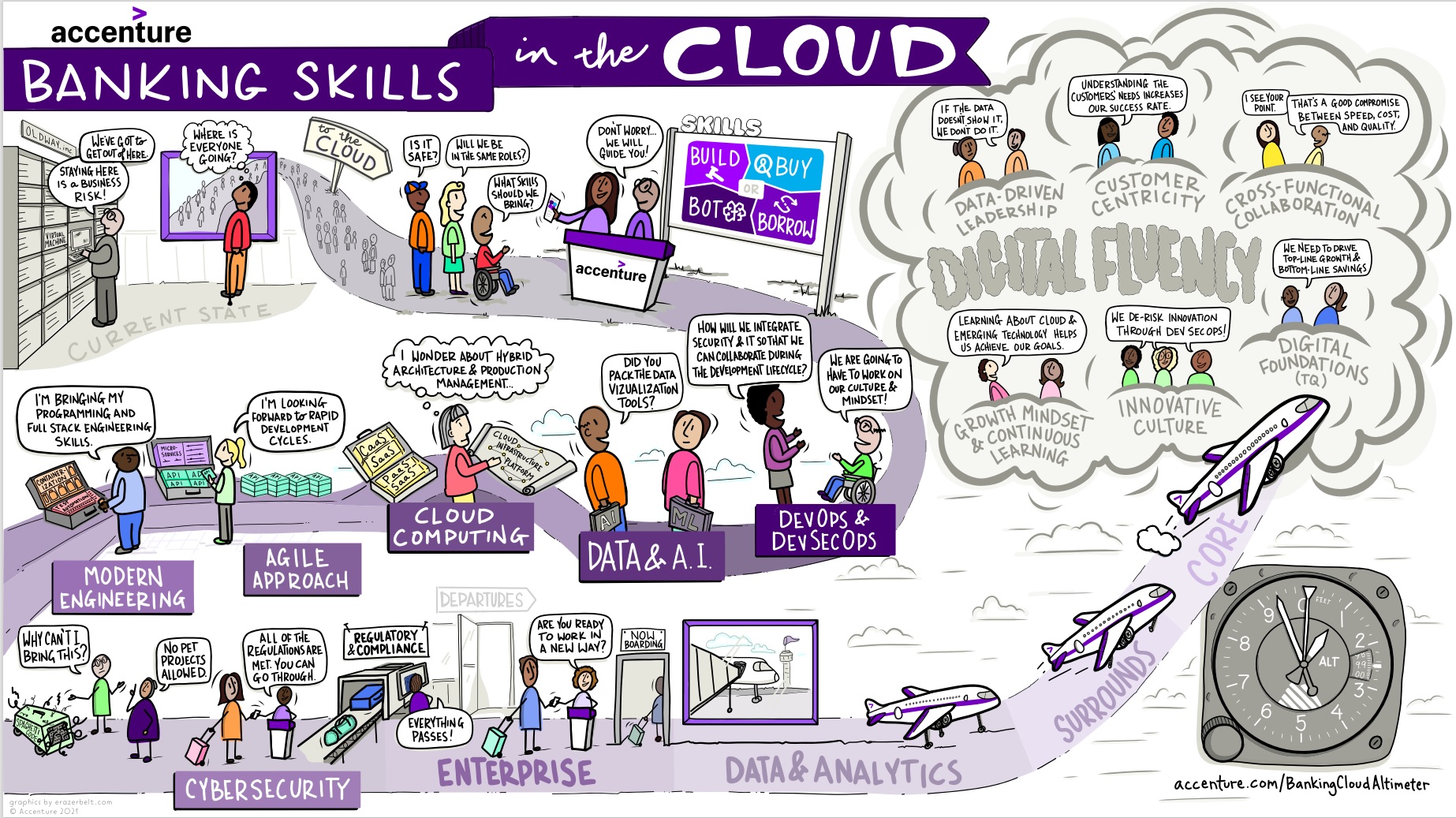Other parts of this series:
Fierce competition for talent is nothing new in banking, where digital skills have been in hot demand for years. But this familiar struggle is moving to a new arena as the search for talent moves, like much of the industry, to the cloud.
This is primarily due to two factors: the cloud’s unique ability to supercharge organizational agility, and the fact that cloud fluency is required to fully leverage other emerging technologies like artificial intelligence, machine learning, and natural language processing.
Most banks are making significant investments in the cloud and planning to migrate core computing workloads in the coming years. Our research on “Mainframe Migration to the Cloud in Banking”—which we outline in the current issue of the Banking Cloud Altimeter—surveyed 150 banking executives across 16 countries and found that 82% of large banks that are planning to or are in the process of moving at least half of their mainframe workloads to the cloud. Of those aiming to move 75% or more of their workloads to the cloud, most plan to achieve that goal within the next five years.iv>
More Accenture analysis has found that banking is ahead of most industries in its cloud adoption, which includes sourcing and training the skills needed to maximize the cloud’s potential. In terms of cloud adoption, banking leads industries like insurance, automotive and travel while trailing only a few high-tech industries like software.
But hiring, on its own, is not a viable solution to the talent problem. Demand for both cloud technologists and cloud fluency across the entire organization is rising in banking and beyond. There is not enough external cloud talent to meet the demand.
The mainframe report mentioned above, for instance, revealed strong demand for all cloud-related skills at banks planning to migrate their mainframes to the cloud, while a 2021 Global Knowledge survey of more than 3,000 IT leaders found that cloud skills shortages will costs employers up to $22,000 per employee, per year.
That same survey also found that 70% of IT leaders believe cloud computing, cybersecurity and DevOps are the most difficult areas for finding qualified tech talent—and that there is an eight-month lag, on average, for hiring priority cloud resources.
The upshot of all this is that without upskilling, banks will remain constrained in their reach for the greater agility and value that cloud transformation can bring.
But exactly what skills are we talking about?

Banking Cloud Altimeter | Volume 6: Banks need a flight plan to navigate the cloud.
LEARN MOREA closer look at the skills that fuel cloud success
This is an important question that too often goes unanswered. The cloud is a hot topic in banking and beyond right now, and “cloud skills” are frequently discussed as if they were one single skill, like riding a bike or speaking German.
But this is not the case. Accenture’s cloud skilling program breaks down “cloud skills” into different categories and specific abilities.
At the highest level, the program distinguishes between technical and behavioral skills. Technical skills are the ones people need to design, build, operate and maintain cloud computing systems—the real hands-on, technical stuff.
Technical skills are mostly the domain of the IT department. Our analysis has identified six that every bank’s IT team should have:
1. Cloud computing: the capability to architect and operate virtual infrastructure, platforms and apps to improve a bank’s speed and agility.
2. Modern engineering: Expertise in the design, development, release and sustainment of digital-native tech solutions, including microservices and APIs.
3. Data & intelligence: Understanding the principles of structuring and managing data and modelling with machine learning.
4. Agile: The application of agile frameworks to design, implement and manage technology projects.
5. DevOps & DevSecOps: Knowledge of the practices and tools that enable high-speed, iterative development.
6. Cybersecurity: Lead the detection of, response to, and prevention of cyber incidents within the organization.
This doesn’t mean that every member of the IT team needs deep expertise in all six of these. But each should have deep expertise in one or two of these skills. For the others, each team member needs to be at least conversant in them—that is, able to explain the topic and have a conversation about them.
Behavioral skills, on the other hand, can be thought of as technology quotient or “TQ” skills. These are much broader and are needed across the entire enterprise as well as in IT. We’ve identified six:
1. Digital foundations: Conversant in core digital technologies and concepts.
2. Cloud value optimization: Establishing the business case for cloud value realization and evaluating progress.
3. Cross-functional collaboration: Orchestrating and driving common business priorities across functions.
4. Data-driven leadership: Embracing data to accelerate decisions and respond in real time to dynamic situations.
5. Customer-centricity: Focusing on delighting customers and delivering value with world-class experiences.
6. Innovation culture: Fostering continuous learning, creativity and strategic risk-taking.

Another important distinction that often gets overlooked in the cloud skills conversation is that different roles within a bank will require different levels of mastery of different cloud skills. To get the most out of cloud, a bank does not need to turn every staff member into a software engineer. But it does need to build a network of cloud evangelists that extends across the entire organization to boost agility and competitive advantage.
In our next post, we’ll look at a four-step process for doing that.
Register to read vol. 4 of the Banking Cloud Altimeter: Is your bank’s culture limiting the value of the cloud?
Learn moreContact me here to discuss your bank’s cloud skilling journey. You can also download the Banking Skills in the Cloud infographic here.











